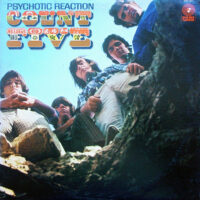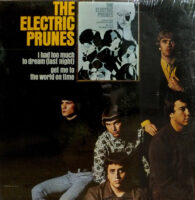
Talk about one-hit wonders… American garage rockers Count Five harnessed all of their creative and instrumental energies into “Psychotic Reaction,” one of the touchstones of garage rock, as Lenny Kaye astutely noted by placing the track on the vastly influential first Nuggets comp. (The legendary critic Lester Bangs fell hard for it, too, writing a fascinating 1971 essay that imagined all the subsequent albums that Count Five would never record.) Sure, “Psychotic Reaction” took cues from the Yardbirds’ “I’m A Man” and other rave-up-enhanced tunes by that British group, but Count Five took that steez to a crazier level. You might say that the song was their psychotic reaction to Jimmy Page, Jeff Beck, and company.
No question, Count Five captured lightning in a bottle with “Psychotic Reaction.” The emotional turmoil of young people heartbreak is/was/always will be a catalyst for extraordinary art, including speed-freak rock and roll. Here, the band locked in on some of the most primal, unstoppable guitar riffs and drumbeats ever, and then proceeded to rocket out to the farthest zones that 1966 had to offer, leaving behind the 13th Floor Elevators and perhaps even Love’s “7 And 7 Is.” But also take a moment to think about an America in which a track as gonzo as “Psychotic Reaction” could peak at #5 on the singles chart. How far we’ve fallen as a nation…
Let us note that Psychotic Reaction is more than just its cataclysmic title track. The LP opens with a potent 1-2 punch: “Double-Decker Bus”’s agitated, harmonica-augmented garage rock with a tense, hair-raising rave-up that’s not as explosive as “Psychotic Reaction” (what is?); and “Pretty Big Mouth,” a cool, sleazy, mid-tempo dancer about “making a woman mine”—a common topic among ’60s garage-rockers. In fact, that subject also arises in the next song, “The World,” which is in a similar musical vein to “Pretty Big Mouth,” but it has dorkier vocals. It’s important to remember that all of Count Five’s members were 18 and 19 when this album came out.
The first of two (!) Who covers here, this “My Generation” proves that it’s a fool’s errand to try to interpret one of ’60s rock’s foundational anthems. Sadly, Count Five just aren’t up to the task, but you gotta admire the balls on these guys… Simply put, Count Five—including main songwriter, guitarist, and vocalist Sean Byrne—don’t have the Who’s instrumental chops or vocal charisma (especially the latter) to approximate the original’s firepower. The other Who selection, “Out In The Street,” makes one ask “Why?” I mean, it’s a brave attempt at one of Townshend’s brash, youthful statements, but Count Five don’t really deviate from the original. Wasn’t there a non-Who song that these dudes could’ve covered?
Speaking of emulating British Invasion artists, Count Five delve into some 1964-era Beatles worship on “She’s Fine” and “Can’t Get Your Lovin’,” but—let’s not mince words—singer Kenn Elner kind of sounds like a doofus. Better is “Peace Of Mind,” which is the perfect counterpart to the Red Crayola‘s “Hurricane Fighter Plane.” It’s the album’s second-best song, a driving garage-psych beast that, of course, has been overshadowed by the title track. And DJs should be aware that the woozy, watery rock of “The Morning After” would segue well into Nilsson‘s “Coconut” or Three Dog Night’s “Mama Told Me (Not To Come).”
Look, I’m not going to sit here and tell you that Psychotic Reaction is a classic album. However, it does have enough interesting takes on primitive garage-rock moves to make it a keeper. And with a running time of under 26 minutes, the record efficiently delivers its rambunctious and boozy pleasures. -Buckley Mayfield
Located in Seattle’s Fremont neighborhood, Jive Time is always looking to buy your unwanted records (provided they are in good condition) or offer credit for trade. We also buy record collections.



